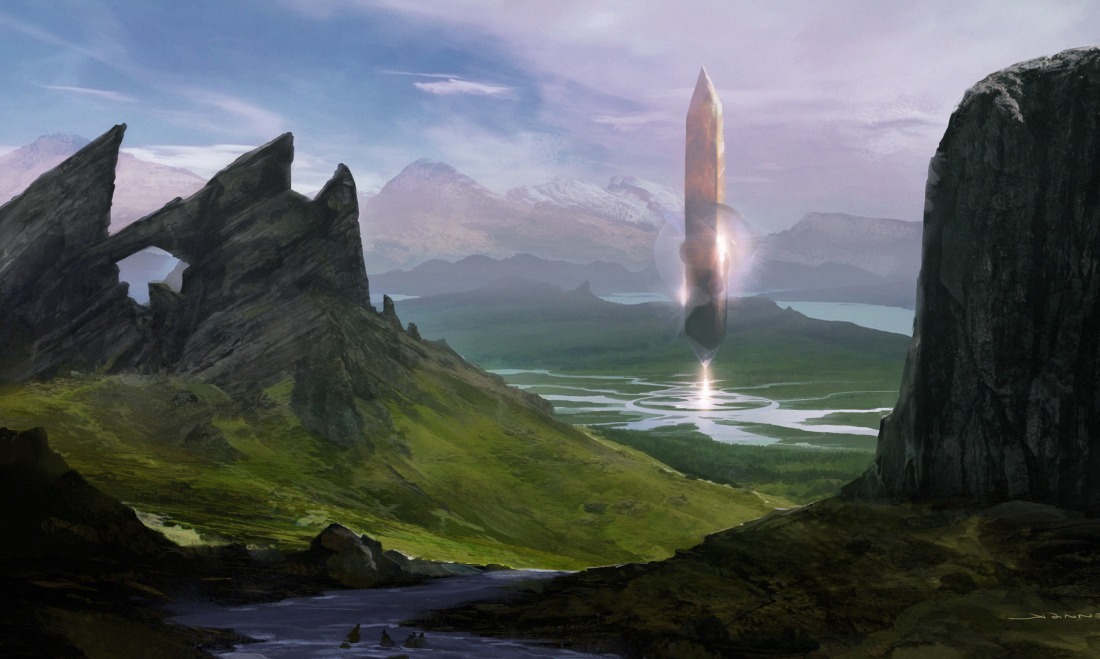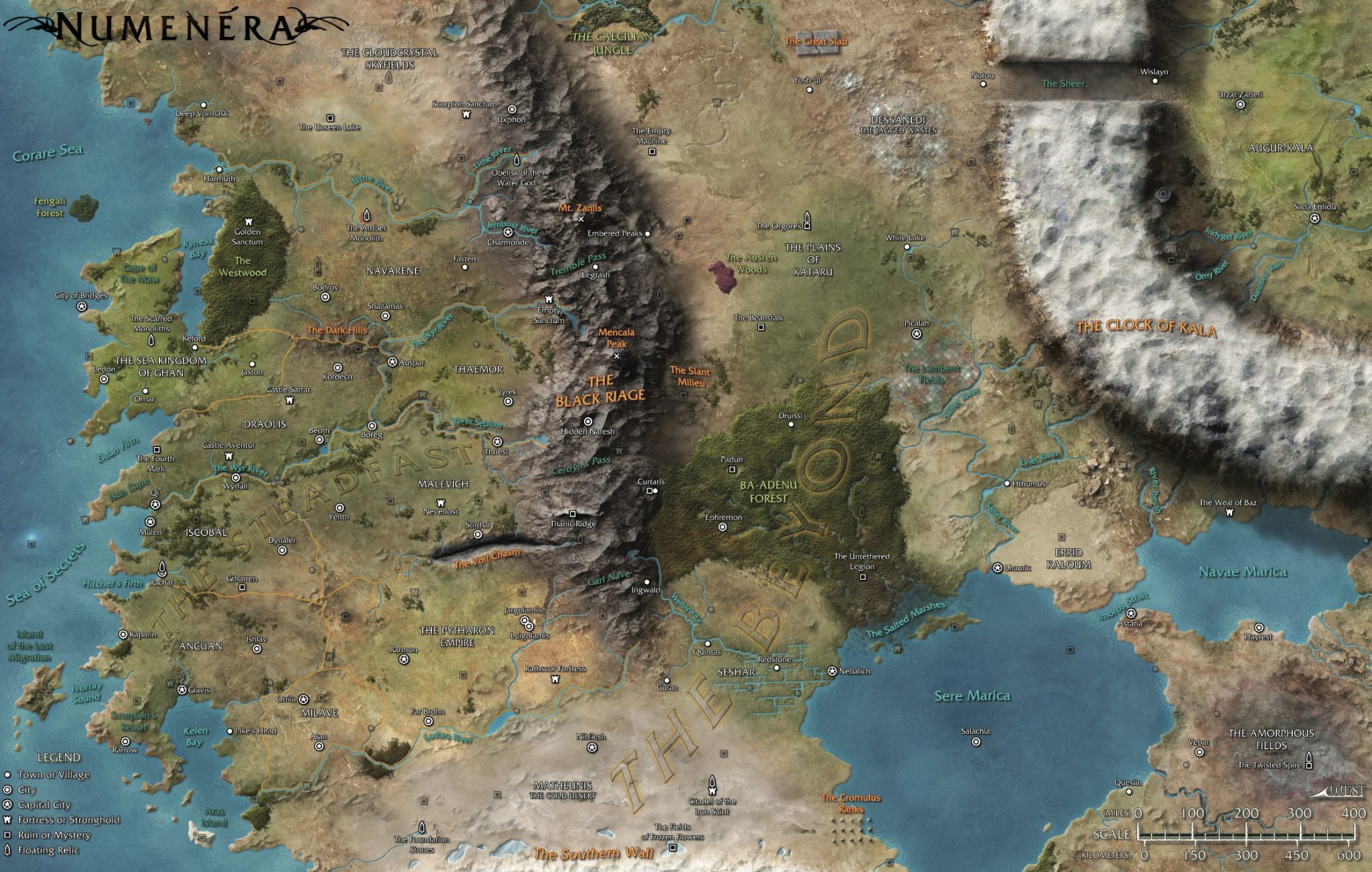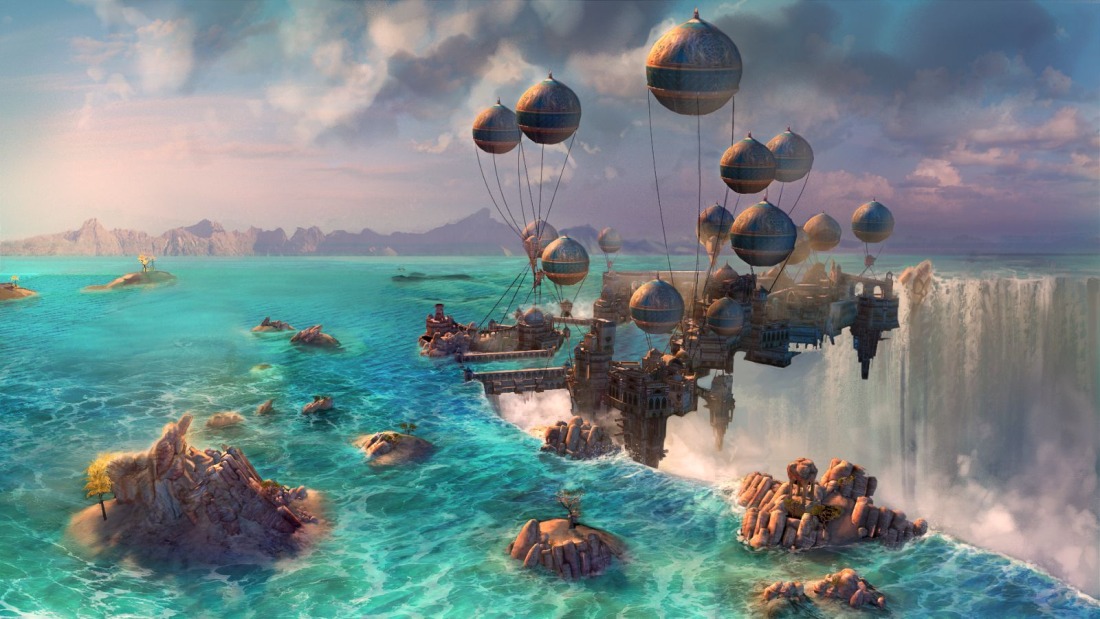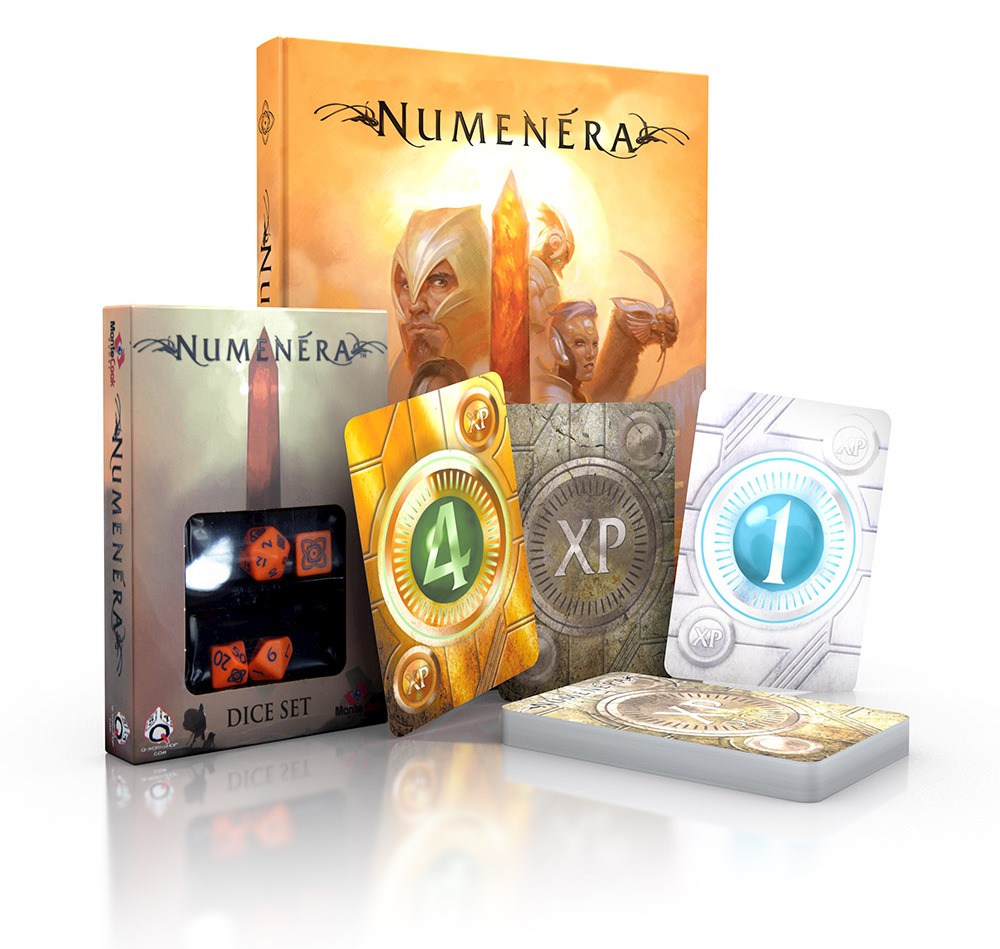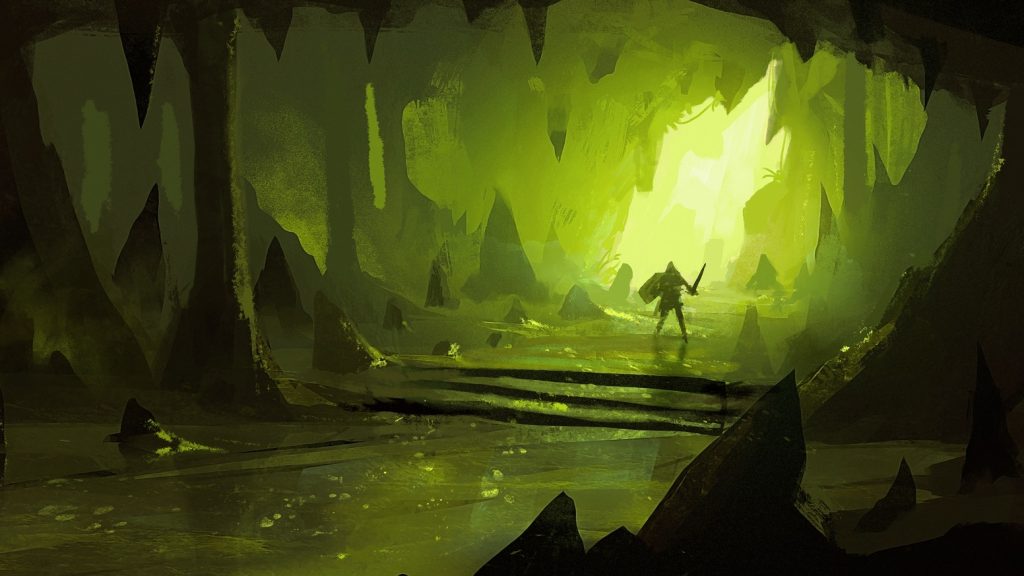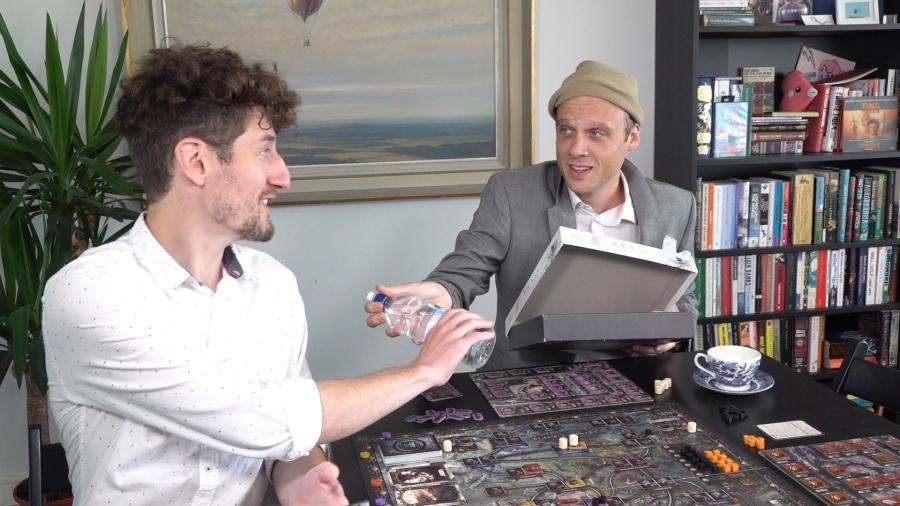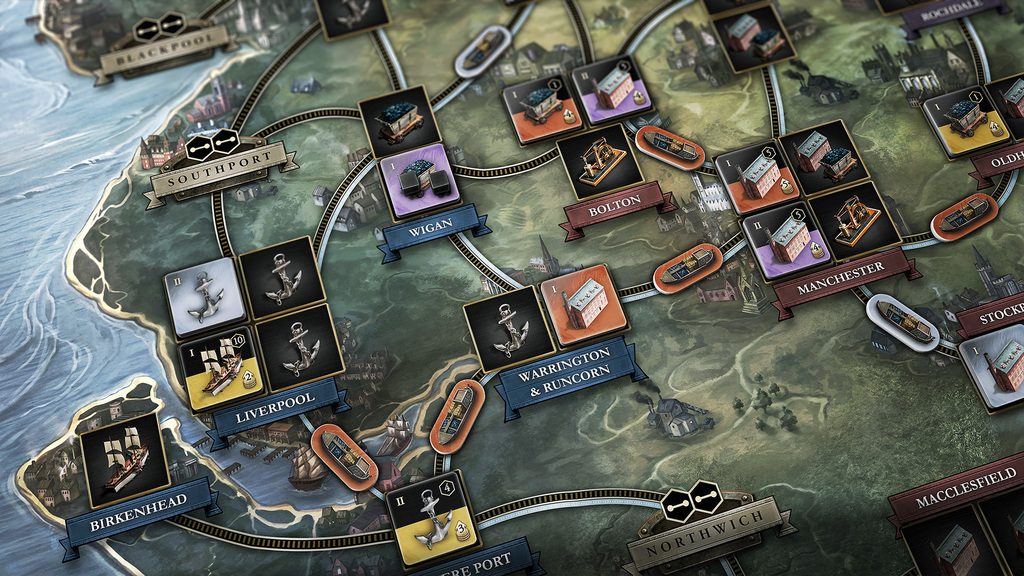Cynthia: Imagine rising to the top of a valley and discovering the above vista: green hills, snowcapped mountains, seemingly pristine waters, and an obelisk, tens of thousands of years old, humming with magical (or mechanical?) power. You could be the first to learn all of its secrets, or simply find out how it works, and harness its power. And that could be just the beginning of your earthly adventures.
For this uncanny place is our Earth, far, far, far into the future, after our civilization and seven others have climbed, peaked, fallen, and been rusted over. More than one alien invasion has occurred, and more than one alien species has mingled genes with humanity. A new civilization has arisen, but hasn’t really gotten past the middle ages. The perplexing debris of past civilizations, from humming obelisks and transdimensional portals to enchanted amulets and portable CD players, is everywhere. The people of earth call these weird objects “filled-with-power-things”: numenera.
Welcome to the Ninth World, the setting of Monte Cook’s Numenera. I would say, “come on in, the water’s fine,” but it’s probably filled with flesh-eating microdroids or laced with bubble-gum flavored psychotropic drugs or something. But forget the water, there’s so much here. This place is so ancient, and vast, and tremendous. Let’s explore!
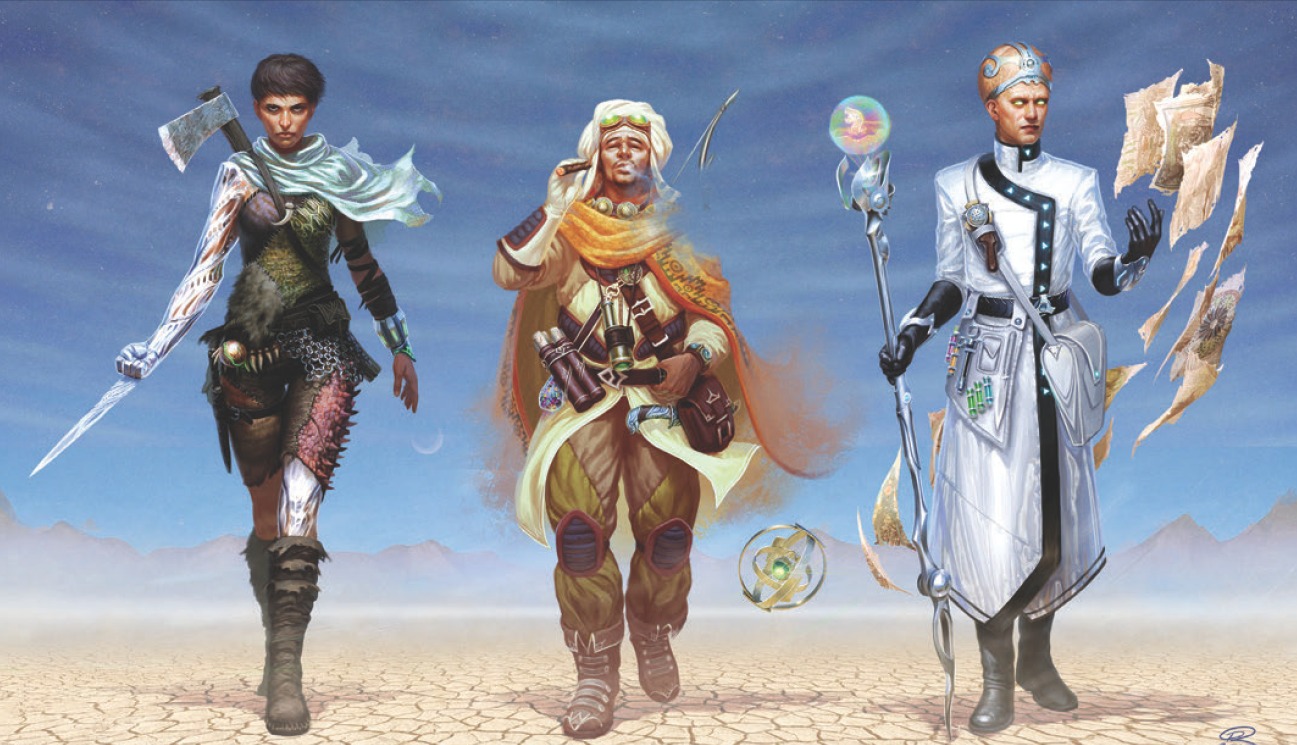
Look over there! The words “We will help you” keep appearing in the sky in bright orange. No, nobody knows who is going to “help,” but I do hope they start helping soon. Oh, and did you find out why that thick black bracelet you found knows how far you’ve walked today? Anyway, let’s see if the giant Face of Ghan can answer our burning existential questions. Or we could visit the miniature city of Archeol and find out what creatures live there. Or we could go north, to the Unseen Lake, where I hear that fish seem to swim through the air.
Let’s start exploring now because it might take years to visit just the regions of the Ninth World described in the Numenera core book. There’s also The Ninth World Bestiary, The Ninth World Guidebook, and the Technology Compendium, as well as sourcebooks for the sky, the sea, and more. Always more. There’s even a small official .pdf called Love and Sex in the Ninth World. If you’re into that sort of thing.
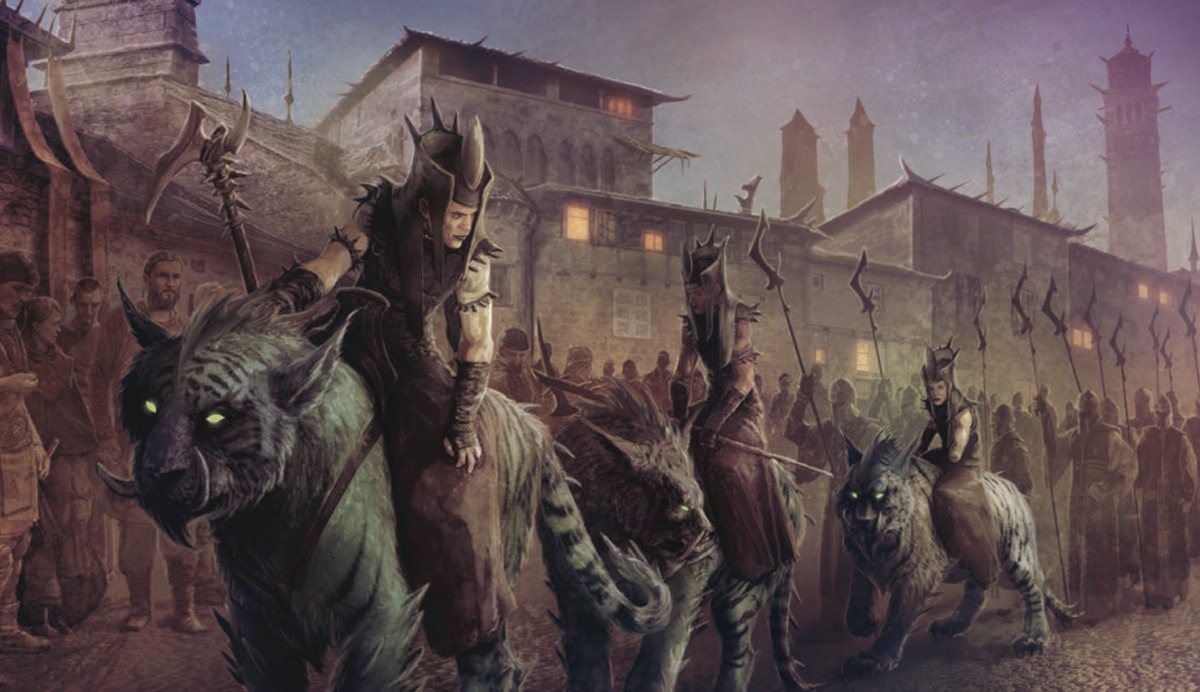
You see, Numenera lures you in with the promise of infinite adventures in a relentlessly enchanting setting where something completely new is always just around the bend. Then it ruthlessly captures you with a streamlined d20 system that’s easy to play and to learn.
Every task you attempt has a difficulty level with a target number: you must roll above that number. For instance, figuring out how to operate a liquid sword might start off as a level 5 task, meaning you need to roll at least 15 to succeed. Easy.
Skills and equipment then lower a task’s difficulty, so that if you’re trained in numenera, using the device goes down to level 4: you need to roll at least 12. If you want to put in some effort, spend a few points from your Intellect pool and take the task down to level 3. Now the odds are in your favor and you need only to roll above 9.
Now you can cause this device to spurt fluid in the shape of a sword that is somehow still highly viscous and sharp enough to cut people. Congratulations?
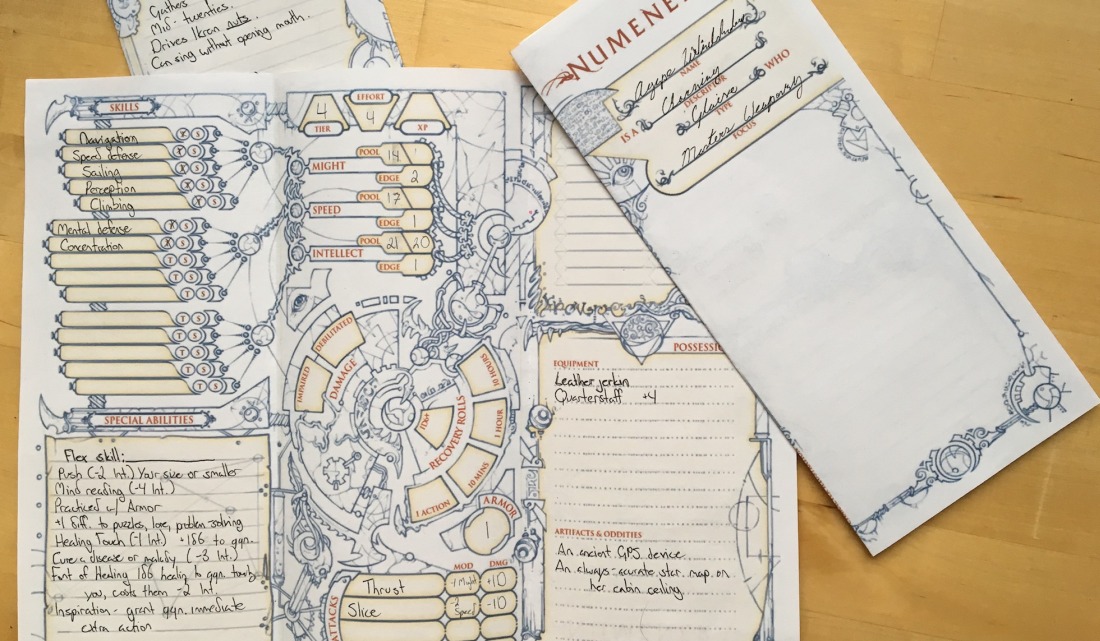
You might also be able to do some fancy tricks like operating machines telepathically, using two weapons at once, or singing in a way that people actually enjoy. Those tricks usually cost Might, Speed, or Intellect points, but don’t worry. Unless your blood has been drained by a sentient floating saw, or you’re trying to outwit a psychopathic cult leader, or you’re outrunning a ravenous, blind, pointy-tusked bear, you’ll have points for days.
Conveniently, this trio of Might, Speed, and Intellect point pools also constitutes your character’s health, so you can be low on Might but still have all your brainpower, or the ability to make a quick getaway.
But there’s one Numenera mechanic I find particularly sexy: any time the GM has a clever idea, they can turn to you (with a wicked smile) and offer you two of the Experience Points that let you grow your character, one for you, one for you to pass to a friend. Accepting the proffered “XP” means giving the GM the go-ahead to put their idea into action. If you’re afraid of what the GM has in mind, then spend an XP you’ve got on hand in order to dispel their devious plan.
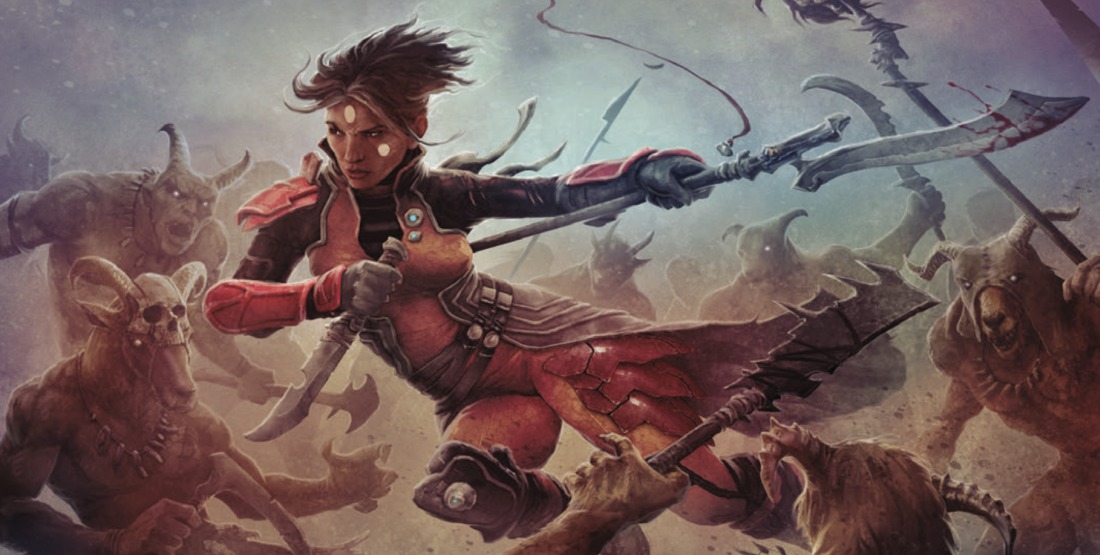
This give-and-take lets the GM bend the narrative a little according to their will –– but in a way that characters always benefit and never feel picked on or railroaded. In return, if you roll a 19 or 20, you can declare a minor or major effect. A minor effect might be distracting an enemy or making a harsh climb easier for the whole party. A major effect would be disarming that enemy or conquering that climb with unprecedented ease.
All in all, it’s a bit like the latest edition of Dungeons and Dragons but with even clearer rules, less math, more give-and-take, and a lot more flexibility. You don’t need to worry about choosing the right weapon or provoking an attack of opportunity. You can try things you’re not trained in and still frequently succeed. You can invent skills. You can levitate, or have tentacles, or have chlorophyll in your skin, or all three. You can be a lover and a fighter and a thinker and whatever else you want to be. Really.
And what will you do in this marvelous new persona? Really, begin by just exploring. Look at this map!
Click on it to see it a little bigger! Scroll around it. Listen to the promises it makes.
Plenty of dangerous, miraculous things will happen to along whatever road you choose. You could go to the City of Bridges and then take to the seas in the employ of smugglers, or dedicate yourself to protecting a vulnerable town in the uncouth lands of the Beyond. You could walk along a continent-spanning pilgrimage circuit with thousands of other nomads. Numenera works well for Lovecraft-esque horror stories. And medieval fantasy adventures. And dark, urban religio-political intrigues. And colonization epics. It really is a brave new world. You might even find the Miranda to your Caliban… or something.
Now, this next bit is serious: I think we know each other well enough that it’s time I tell you something about my history with RPGs and Numenera in particular. This is embarrassing, but reader, I trust you.
The first time I played a roleplaying game, I had a severe anxiety attack. The players chose our pre-generated characters and were introduced to the setting, rules, and adventure. Then the GM turned to me and asked that fundamental question: what was my character doing? I froze. I could barely speak. I ran to the bathroom, and hid there crying for at least half an hour.
But Numenera (and the coaxing of a very patient GM) got me to come back downstairs. The Ninth World was intriguing enough that I wanted to play despite the anxiety. The system was transparent enough that by the end of the session, I felt much more comfortable. Indeed, Numenera got me into RPGs. And I’m rather thankful for that.
I bring this up because my rough first time has made me aware that, if you did not spend your teenage years playing Dungeons and Dragons, it can be quite scary to dive into RPGs. Clearly, Numenera works as a first RPG, which is why I ran it for my nineteen-year-old nephew and his friends, but I think an experienced GM should coach you on your first steps. The mechanics are simple, but not basic, so its good to have a confident and practiced guide at the table. And a fair amount of prep work is needed to keep players from becoming lost in this vast, unfamiliar place –– even with a pre-written adventure.
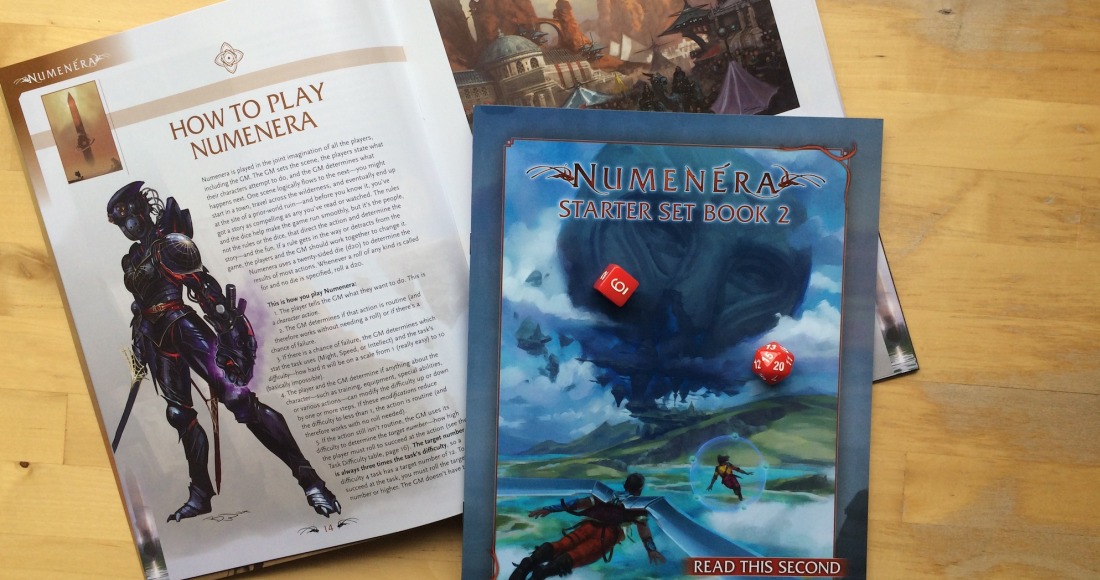
A Numenera Starter Set (seen above) does now exist, theoretically designed to for people new to RPGs, but it’s not good. It’s “entry-level” adventure has no grabbable plot hook and gives the GM a lot to manage with not much guidance. The pre-generated characters are bland and poorly representative of the possibilites. The components include flimsy character sheets you can’t erase on, two plain red dice, and a poorly detailed single-sided map. And this Starter Set costs a few dollars more than a well-indexed .pdf of the system’s beautifully illustrated core rulebook, filled with creatures and cultures and cults and mysterious landmarks and glowing oddities and everything.
IN CONCLUSION, Shut Up and Sit Down highly recommends that you leap into the vast abyss of Numenera, which might be packed with more sheer, marvelous, possibility than any other RPG. There seem to be no limits to the Ninth World, no way to run out of adventures. So download that core rulebook, or perhaps invest in the Numenera Corebook Bundle, which contains a few extra useful things.
Then, relax. Don’t be afraid. Take a deep breath. Find a good GM (or step up to the plate yourself if you’re comfortable), open your eyes and ears and let the game take you somewhere that you never dreamt of before. Yup, A Whole New World is stuck in my head now too. It’s fine. It’s great. Go play Numenera and HAVE FUN.

